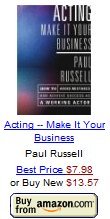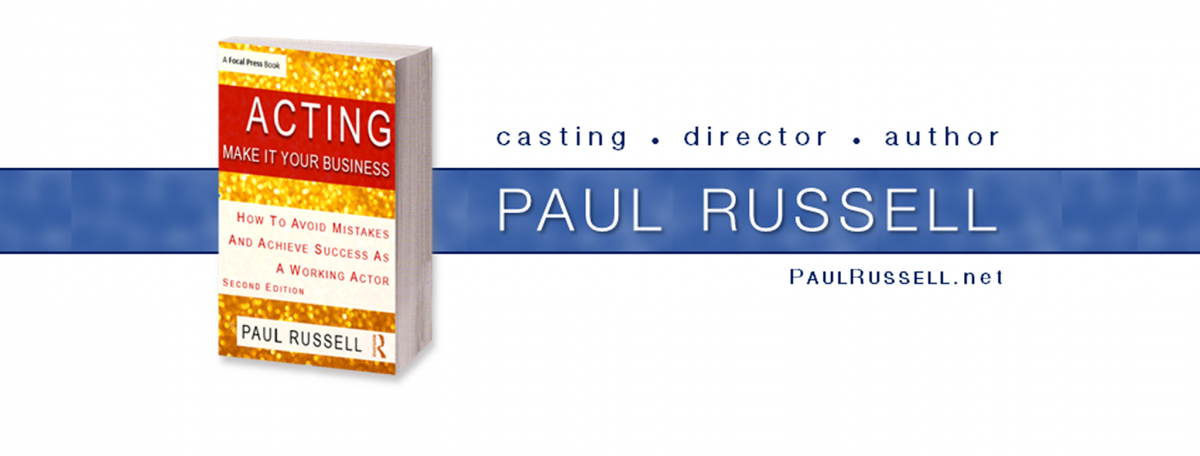
98% of thespians I encounter quantifying themselves as artists are viewpoint blind actors.
Are you, as an actor, effectively communicating a viewpoint with each word you utter? Do you fully value viewpoints? It’s the rare actor that can make a single word layered with multiple variations of expression. In short; possess viewpoints simple or complex.
There are easy exercises to assist actors to be more effective on viewpoints. But first, what is a viewpoint?
In auditions and projects which I direct I occasionally encounter actors who dart over phrases and words in which the actors of emotional ennui divest themselves of a connection, believing that words alone will do the labor required for facilitating story or character clarity. These lackadaisical linguists are actors failing to convey a viewpoint.
A viewpoint is similar to subtext but broader in definition beyond being ‘what’s not being said.’ A viewpoint, subtle or blatant, engages the listener to hear more than the word and digest the speaker’s (i.e. actor as a character) opinion, reaction, observation, desires, needs, objectives (or all of the preceding) when implemented to phrases or a single word.
Exercise #1: What’s Behind the Words?
Listen to your inner voice as you read the following excerpt from Lerner & Loew’s MY FAIR LADY. Eliza Doolittle confronts an ineffectual and undemonstrative suitor.
“Words, words, words
I’m so sick of words.
I get words all day through,
First from him
Now from you
Is that all you blighters can do?”
Now ask yourself the following:
- Did you just repeat the opening of ‘words, words, words’ or did you isolate each with an emotional variant?
- Did you consider the character’s emotional reaction towards ‘words?’ What is her viewpoint?
- Is the first utterance of the word ‘words’ an explosion of angst representing her resentment towards people who value words more than action?
- Could there be an underlying hint of her annoyance of her unspoken and yet to be consciously aware attraction for a man (not present) she believes both arrogant yet attractive? An attraction stronger felt than that for the suitor to whom she’s speaking?
- Are the second and third utterances of ‘words’ merely echoes of prior emotion or… can the second ‘words’ be a question, as in ‘Why are vowels and consonants which cannot be held in hand more important to some people as opposed to embracing those we love? Is the final ‘words’ self-reflective; in which the character’s strength shows a crack of weakness?
- When the character voices, ‘I get words all day through. First from him, now from you.’ how does her viewpoint differ between ‘him’ (referring to Henry Higgins) and ‘you’ (referring to Freddy Eynsford Hill)? In a flash the audience must hear the variances, whether one viewpoint is subtle confusion on ‘him’ as opposed to in-your-face contempt for ‘you.’
- What does the character desire via these words? What’s the hoped for endgame? Is a resolve expected?
Many questions.
Similar inquiries as to your character’s viewpoint must be asked of and by yourself for nearly every word voiced as an actor for each character you portray, whether in an audition or production. (The actors who provide strong viewpoints in auditions are the actors who get paychecks in return.)
Now re-read the passage utilizing viewpoints I provided (in parenthesis and via text formatting). Listen to the difference within your inner voice as it reacts to the changes including how the color changes color your viewpoint.

(Yes, it was a bit extreme… but hopefully you got the viewpoint(s) .)
Viewpoint Exercise #2: Observing Viewpoints
I recently directed the regional premiere of A FREE MAN OF COLOR in which I was honored to work with legendary John Guare (SIX DEGREES OF SEPARATION, HOUSE OF BLUE LEAVES). Below is text from AFMOC spoken by the character Meriwether Lewis as he encounters a hooded stranger in the wilderness of the uncharted Louisiana Purchase.
Read first and then we’ll discuss your interpretation on the other side:
“Hello? What tribe you from? I speak bit of Mandan. I’m separated from my party. You like pocket mirror? See self. Beads? Silk ribbons. Ivory comb. Tobacco. Tomahawk that can be pipe. Vermillion face paint.
(taking out list)
How long do Indians live?
How do you treat small pox?
Diseases of venery.
What kind of animals do you keep?
What kind of games do you play?
Does the Missouri flow northwest? Southwest?
Or just west?
I have food? Tasty beef and eggs and vegetable boiled into a paste? M-m-m! You want?”
Did you laugh your ass off when reading the passage? No? Well, if you, as an actor, were an effective thespian you would have discovered that the above text is a gold mine for laughs.
When I was rehearsing this passage with the actor playing Meriwether he rambled through the lines. I stopped him and asked, “What’s your viewpoint?”
To his silent questioning face I elaborated, “Here is Meriwether Lewis meeting an unknown entity. Does the person he is meeting understand English? Does the stranger hear him? Even if the stranger had a slight comprehension of the encounter how much of the questioning is understood?”
I asked the actor to demonstrate each of his inquiries. Give vocal and physical viewpoints of Meriwether to each question: Let the stranger and audience know Meriwether’s relationship / knowledge to the objects or actions within his questions.
When the actor spoke about diseases of venerary he vocalized (and displayed) Meriwther’s perhaps own history and experience with syphilis or gonorrhea. The actor brought opinions and reactions to nearly every inquiry within the passage. (The tomahawk became great fun when I asked the actor, “So what weed do you think Indians smoked?”) The actor delved beyond what was written on the page and brought his and his character’s viewpoint to the words. He was no longer just reciting but living. He was being a successful story-teller. He was working the number one essential required to be an actor.
Exercise #3: Viewpoints are Reactions:
Finding a viewpoint is simple. How do you react to the following words:
Fart
Anchovies
Chocolate
Roses
Now bring your viewpoints for each of those words when combined in the following sentence:
“His farts smell of anchovies and chocolate; never of roses.”
You may like ‘his’ farts because you’re allergic to roses. Or you may be conflicted between disgust and contempt because you hate anchovies but love chocolate and now chocolate is ruined for you by his gaseous emissions.
On a recent master class visit to Elon University I encouraged students to provide various viewpoints to the individual words and then I scrambled the positioning of the words (and students creating opposite viewpoints to their original ones) within the sentence. This jumbling of strong viewpoints made for interesting interpretations of the same words when utilized differently.
Whatever your opinion, reaction, observation… bring viewpoints to whenever you speak as an actor.
My Best,
Paul
 Read advice from legendary talent agents,
Read advice from legendary talent agents,
plus Hollywood & Broadway actors in Paul Russell’s Best-Selling Book ACTING: Make It Your Business!
Share Answers for Actors: |
Follow Paul Russell Casting: |
Paul Russell’s career as a casting director, director, acting teacher and former actor has spanned nearly thirty years. He has worked on projects for major film studios, television networks, and Broadway. Paul has taught the business of acting and audition technique at NYU and has spoken at universities including Yale, Temple and the University of the Arts. He is the author of ACTING: Make It Your Business – How to Avoid Mistakes and Achieve Success as a Working Actor. For more information, please visit www.PaulRussell.net.
Get One-On-One: |
Get New Insights: |
Get The Feed: |
 |
 |
|
Visit Paul @ PaulRussell.net and/or: |
||






Reblogged this on KAST 'N' KREW.